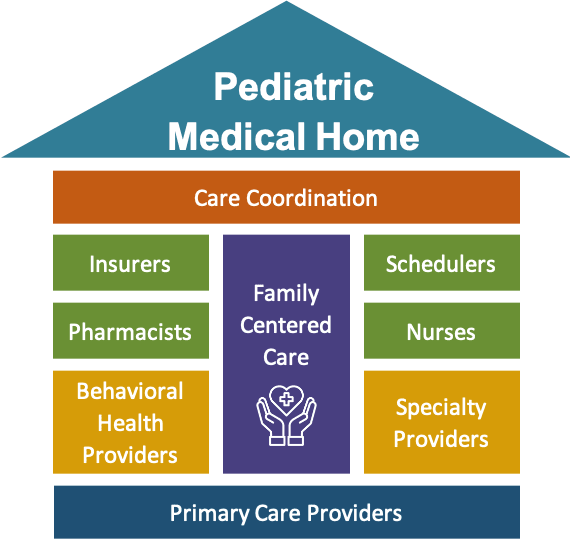Pediatric Medical Home Initiative
A medical home is a patient-centered approach to providing comprehensive, coordinated primary care. It is a team-based healthcare delivery model organized across all elements of the broader health care system, and includes active collaboration between families, primary care providers, clinical specialists, behavioral health providers, hospitals, and community programs. It has become a widely accepted model and is considered the gold standard for how pediatric primary care should be organized and delivered throughout the healthcare system. Receiving care in a medical home is recommended for all children but is essential to ensuring optimal outcomes for children and youth with special health care needs.

Family engagement and family-centered care are extremely important pieces of the medical home. Parents and caregivers are the people who know their child best and should have an active role in their child’s healthcare. Creating effective partnerships between families and clinical practice teams through strength-based approaches can improve outcomes, increase patient satisfaction, and decrease health care costs.
Care coordination and community referrals facilitate the linkage of children and their families with appropriate services and resources to address all social related health needs. Building medical home capacity not only helps providers address a patients’ medical needs, it also helps them address family challenges related to social barriers health through expanded community referral networks (i.e. access to housing, food, education, transportation, employment and more).
For Medicaid providers, the medical home model offers an effective framework to support delivery of Early, Periodic, Screening, Diagnostic, Treatment (EPSDT) preventative health care services.
Key Medical Home Services
The Bureau of Family Health focuses on 3 key medical home services: holistic care coordination, developmental screening, and youth health transition. We have created toolkits on each of these topics to guide providers through the process of implementing or improving their clinic service. We also offer state-specific resources and training and support services to customize your QI goals. Please email Patti.Barovechio@la.gov to learn more about these training opportunities.
Care Coordination
Care coordination services work to address the intersection of medical, social, developmental, behavioral, educational, and financial needs of a patient. Coordinated care supports the efficient delivery of health-related services across systems and leads to optimal child and family health outcomes.
Developmental Screening
Universal developmental screening in for children ages 0-5 improves early detection of developmental delays and disabilities in children. It provides an important avenue for referring children to early intervention services, which can help minimize delays and disabilities and maximize children’s ability to learn and thrive. Learn about the Louisiana Developmental Screening Initiative here.
Youth Health Transition
Youth health transition (YHT) is the process of shifting from a pediatric to an adult model of health care. It is a specific type of care coordination that requires a gradual transfer of health care responsibility from a parent or guardian to their teenage child. Receiving transition services improves both short and long-term health outcomes for adolescents that receive them. Pediatric providers can assist teens in this process by providing specific, transition-focused services and routinely checking in with patients as they age to get them more involved in their health care.
The Family Resource Center can help with all 3 of these pediatric medical home services and more! They support providers and families with health information, resources, community referrals, and health system navigation. The team is available to answer questions and give personalized recommendations based on a child’s case. You can contact the Family Resource Center via email at BFH-FamilyResourceCenter@la.gov or give them a call at (504) 896-1340 (Monday – Friday, 8 am – 4 pm).
Helpful Toolkits & Resources
Care Coordination Toolkit ›
An online toolkit to help practices improve or implement care coordination services into their clinic workflow.
Developmental Screening Toolkit ›
Use this online toolkit to implement the Louisiana Developmental Screening Guidelines and integrate developmental screening services into your day-to-day practice.
Youth Health Transition Toolkit ›
Pediatric practices can use this toolkit to add YHT services into their clinic flow. It is customizable based on clinic goals, and will help to assess, plan, and implement services at your own pace.
Children's Special Health Services Regional Resource Guides ›
Printable guides with resources for pediatric services and programs for each region of the state. The guides include basic service information, eligibility criteria, websites, and contact information.
Developmental Screening Resource Guides ›
Review these guides together with families to introduce them to services and screening-related resources. Each regional guide has local contact and referral information for agencies and services.
Family Resource Center ›
A virtual resource hub that supports pediatric providers and families of children with special health care needs by connecting them to resources in their communities and around the state.


